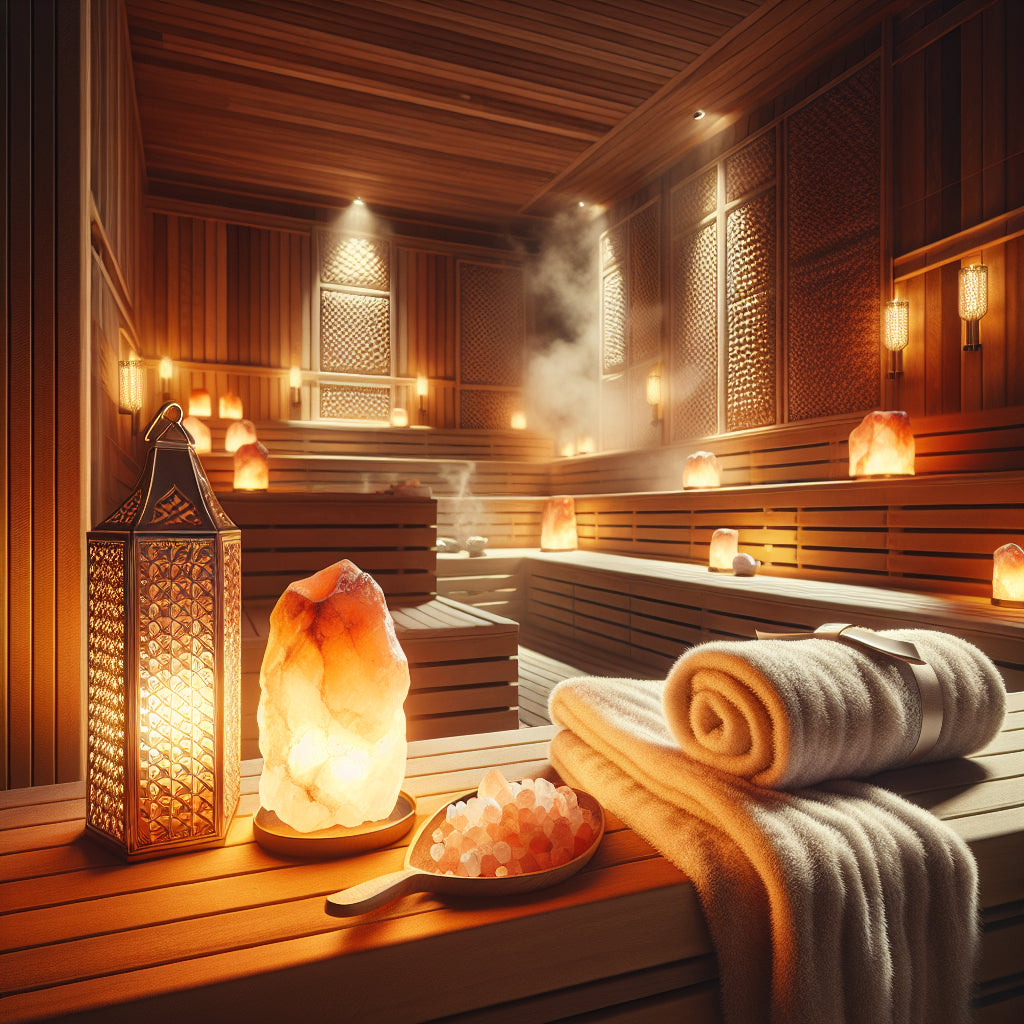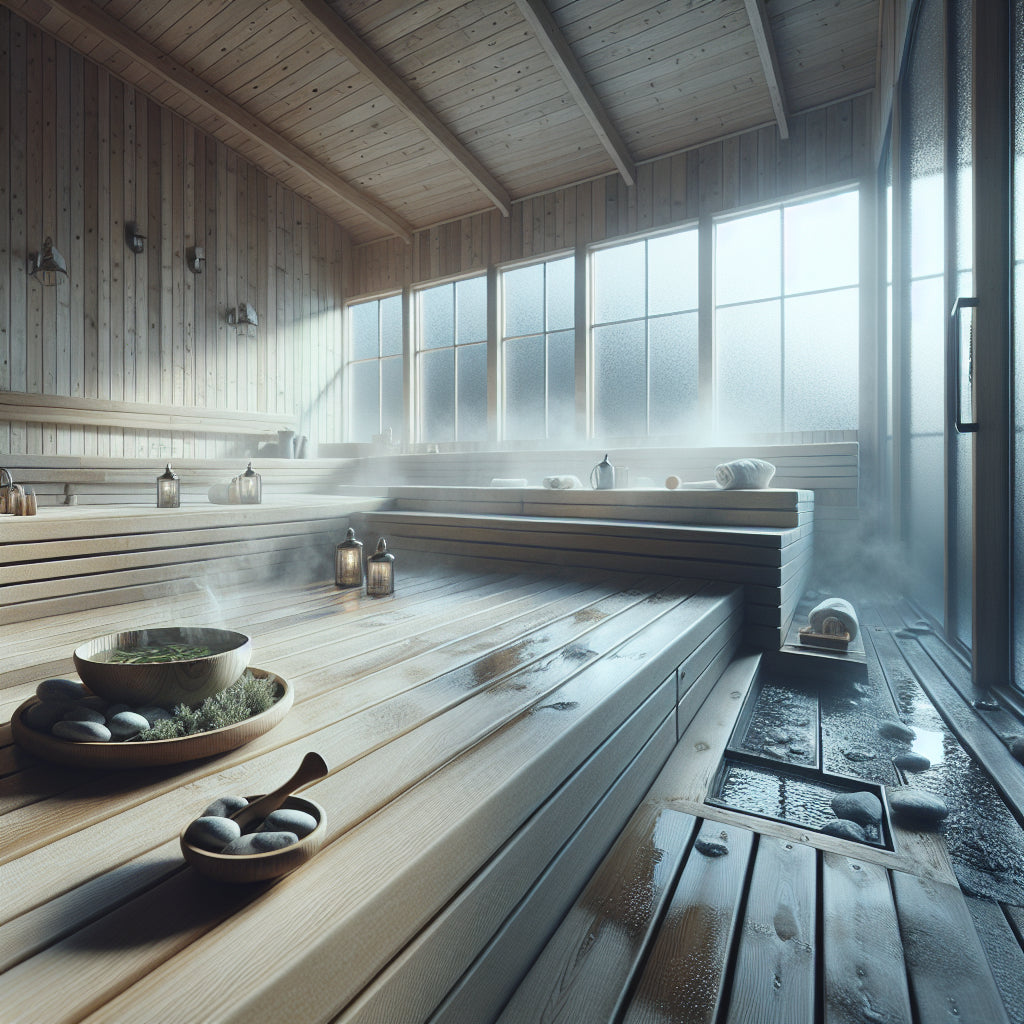The Anti-Aging Power of Saunas: How Heat Therapy Extends Your Healthspan
The search for effective anti-aging strategies has led many people back to one of humanity's oldest wellness practices: the sauna. While wellness trends come and go, emerging research reveals that regular sauna bathing offers profound benefits that extend far beyond simple relaxation. From protecting brain health to supporting cardiovascular function, saunas may be one of the most accessible anti-aging tools available today.
The Science Behind Sauna Therapy and Longevity
When you step into a sauna, your body initiates a sophisticated response to heat stress that triggers protective mechanisms at the cellular level. This process, known as hormesis, involves exposing your body to mild stress that makes it stronger and more resilient over time.
The star players in this response are heat shock proteins (HSPs), molecular chaperones that protect and repair damaged proteins throughout your body. As Dr. Rhonda Patrick, a leading longevity researcher, explains: "Sauna-induced heat stress activates heat shock proteins, which combat cellular aging and improve mitochondrial resilience." These proteins play a crucial role in preventing protein misfolding and aggregation, processes directly linked to age-related diseases like Alzheimer's and Parkinson's.
What makes this particularly exciting is that these biological mechanisms translate into measurable longevity benefits. A landmark Finnish cohort study published in JAMA Internal Medicine followed over 2,300 men for 21 years and found that those using saunas 4-7 times weekly had a 40-50% lower risk of sudden cardiac death and fatal coronary heart disease compared to once-weekly users.
Cardiovascular Benefits That Mirror Exercise
One of the most compelling aspects of sauna therapy is how it replicates cardiovascular exercise without the physical strain. According to Dr. Jari Laukkanen from the University of Eastern Finland, "Regular sauna bathing appears to be a safe, well-tolerated intervention that improves cardiovascular health comparable to moderate aerobic activity."
The numbers back this up. Research published in the European Journal of Epidemiology found that just 2-4 sauna sessions per week reduced cardiovascular mortality risk by 27% and all-cause mortality by 24%. Another study in Mayo Clinic Proceedings demonstrated that habitual sauna bathing improved cardiovascular function and reduced hypertension markers significantly.
When exposed to sauna heat, your heart rate increases to between 100-150 beats per minute, blood vessels dilate, and circulation improves throughout your body. This enhanced blood flow delivers more oxygen and nutrients to tissues while simultaneously improving arterial compliance and lowering blood pressure. For individuals unable to exercise due to injury, disability, or chronic conditions, sauna therapy offers a viable alternative for maintaining cardiovascular health.
Protecting Your Brain and Cognitive Function
Perhaps the most remarkable anti-aging benefit of regular sauna use involves brain health and cognitive protection. The same long-term Finnish study found that men who used a sauna 4-7 times weekly had a 65% reduced risk of developing Alzheimer's disease and a 66% lower risk of dementia compared to once-weekly users.
The neuroprotective mechanisms are multifaceted. Sauna use improves cerebral blood flow, enhancing oxygen and nutrient delivery to brain tissue. It reduces neuroinflammation, a key driver of cognitive decline, while stimulating parasympathetic nervous system activity that promotes relaxation and reduces cortisol levels. The heat stress also triggers the production of brain-derived neurotrophic factor (BDNF), a protein essential for neuron growth and survival that helps maintain synaptic integrity and cognitive sharpness as you age.
Skin Health and Cellular Regeneration
Your skin is your body's largest organ and often the first place aging becomes visible. Regular sauna use addresses skin aging through multiple pathways, with recent research providing impressive validation.
A study published in the Journal of Cosmetic and Laser Therapy found that regular infrared sauna use over 8 weeks improved skin hydration, elasticity, and epidermal barrier function in adults. Another study in the Journal of Cosmetic Dermatology reported enhanced facial skin elasticity and reduced wrinkles following 12 weeks of sauna exposure.
Dr. Arisa Kimura from Kyoto University notes: "Infrared saunas promote gentle detoxification and skin rejuvenation by increasing microcirculation—an often-overlooked key to preserving youthful skin." The increased blood circulation delivers essential nutrients to skin cells while promoting collagen production, the structural protein responsible for skin firmness. Research in Dermatologic Therapy confirmed that mild hyperthermia improved blood circulation and collagen synthesis in aging skin.
The deep sweating induced during sauna sessions also facilitates detoxification. According to research published in Environmental Health Perspectives, sweating mobilizes and excretes trace heavy metals such as lead and cadmium, reducing the oxidative stress that drives cellular aging.
Inflammation Reduction and Metabolic Health
Chronic inflammation underlies most age-related diseases, from arthritis to cardiovascular disease. Sauna therapy helps rebalance your inflammatory response by decreasing pro-inflammatory markers like C-reactive protein (CRP) and interleukin-6 (IL-6).
Research in the Annals of Medicine demonstrated that moderate sauna exposure reduces oxidative stress and systemic inflammatory load, supporting anti-aging claims. A study in Frontiers in Sports and Active Living found that sauna exposure accelerated muscle recovery and reduced inflammation markers significantly after exercise.
Harvard Health Publishing notes: "For those pursuing longevity, sauna use provides measurable physiological benefits that align with known anti-aging markers such as lower inflammation and improved vascular elasticity." This anti-inflammatory effect contributes to better metabolic health, improved insulin sensitivity, and reduced risk of age-related chronic diseases.
Enhanced Recovery and Physical Performance
Maintaining an active lifestyle becomes crucial for healthy aging, and saunas can significantly enhance your ability to do so. Research published in SpringerPlus revealed that post-exercise sauna bathing increased endurance performance by up to 32% through improved thermoregulation and plasma volume expansion.
For aging adults, this means regular sauna use can help preserve physical capacity and reduce recovery time between workouts. The improved circulation aids post-exercise recovery by reducing muscle soreness and accelerating the removal of metabolic waste products. This allows you to maintain a more consistent exercise routine, which itself contributes to longevity and healthspan.
Mental Well-Being and Stress Resilience
The psychological benefits of sauna bathing extend well beyond momentary relaxation. A study in Complementary Therapies in Medicine found that regular sauna users reported lower perceived stress and better sleep quality compared to non-users. Research in Health Psychology Review showed that sauna therapy reduces cortisol levels and increases endorphin release, aligning with stress resilience and longevity pathways.
Chronic stress accelerates biological aging through multiple mechanisms, including telomere shortening and increased inflammation. By providing a regular stress-relief practice, sauna bathing may help slow these aging processes while improving overall quality of life.
Choosing the Right Sauna for Your Needs
Understanding the different types of saunas helps you make an informed choice based on your preferences and goals:
Traditional Finnish Saunas use heated stones to create high temperatures ranging from 150°F to 195°F with humidity levels between 10-20%. This classic experience produces intense heat that rapidly elevates your core temperature and triggers robust cardiovascular and heat shock responses.
Infrared Saunas use infrared wavelengths to heat your body directly rather than heating the surrounding air. Operating at lower temperatures (120°F to 140°F), these saunas allow for longer, more comfortable sessions while still effectively raising core temperature and stimulating beneficial physiological responses. The deep tissue penetration makes them particularly effective for muscle recovery, pain relief, and skin rejuvenation—as evidenced by the research showing superior skin benefits from infrared therapy.
Hybrid Saunas combine traditional and infrared heating elements, offering flexibility to customize your experience. You can enjoy the intense heat of a traditional sauna or the gentler, sustained warmth of infrared therapy depending on your needs.
For those seeking the ultimate home wellness investment, exploring different sauna options helps you find the perfect fit for your space and lifestyle.
Optimal Sauna Protocol for Anti-Aging Benefits
To maximize the longevity and anti-aging benefits of sauna therapy, consistency matters more than intensity. Based on the most comprehensive research, here's an evidence-based protocol:
For beginners: Start with 1-2 sessions per week, 15-20 minutes per session. This allows your body to adapt to heat stress gradually while minimizing the risk of dehydration or discomfort.
For established users: Progress to 3-4 sessions weekly, with each session lasting 20-30 minutes. Research shows this frequency offers substantial health benefits, with 2-4 sessions per week reducing cardiovascular mortality risk by 27% and all-cause mortality by 24%.
For maximum longevity benefits: Studies showing the greatest risk reductions for cardiovascular disease, dementia, and all-cause mortality involved 4-7 sessions weekly. If you can build up to this frequency safely, the cumulative benefits are impressive—including up to 50% reduction in cardiovascular mortality risk.
Temperature considerations vary by sauna type. Traditional saunas typically operate between 150-195°F, while infrared saunas are effective at 120-140°F. The key is raising your core body temperature sufficiently to trigger the heat shock response and cardiovascular adaptations.
Whether you're installing an outdoor barrel sauna for year-round backyard wellness or an indoor unit for convenient daily use, consistency in your practice yields the best results.
Safety Considerations and Precautions
While sauna bathing is safe for most healthy adults, certain precautions are essential:
Hydration is critical. You can lose up to a liter of fluid during a 30-minute session. Drink plenty of water before, during, and after sauna use. Electrolyte replacement may be beneficial for longer or more frequent sessions.
Listen to your body. Exit immediately if you feel dizzy, nauseous, lightheaded, or excessively uncomfortable. These are signs your body needs to cool down.
Medical conditions require medical guidance. If you have cardiovascular disease, low blood pressure, or have recently had a heart attack, consult your physician before beginning sauna therapy. While research shows stable cardiovascular patients can safely enjoy saunas, individual assessment is important.
Pregnancy considerations. Pregnant women should discuss sauna use with their healthcare provider, as elevated core temperatures may affect fetal development.
Medications. Some medications affect your body's ability to regulate temperature or blood pressure. Discuss sauna safety with your doctor if you take regular medications.
The Growing Medical Recognition of Sauna Therapy
The therapeutic value of sauna bathing is gaining mainstream medical recognition. The World Health Organization and European Society of Cardiology recognized sauna therapy as an adjunctive method for improving cardiovascular and stress resilience in their preventive health guidelines. Additionally, increasing clinical trials focus on infrared saunas and chronic illness management, including metabolic and inflammatory diseases.
This shift from traditional practice to evidence-based medicine underscores how ancient wisdom aligns with modern longevity science. The accessibility and safety profile of sauna therapy make it an attractive intervention for population-wide health improvement.
Frequently Asked Questions
How long should I stay in a sauna for anti-aging benefits?
Research suggests 20-30 minute sessions are optimal for triggering heat shock protein production and cardiovascular benefits. Beginners should start with shorter 15-minute sessions and gradually increase duration as their heat tolerance improves. The key is raising your core temperature sufficiently while remaining comfortable and safe.
Is infrared sauna more effective than traditional for skin benefits?
Yes, according to clinical evidence. Studies published in the Journal of Cosmetic and Laser Therapy and Journal of Cosmetic Dermatology found that infrared saunas provided superior improvements in skin hydration, elasticity, and barrier function compared to traditional heat. Infrared wavelengths penetrate deeper into tissue at lower temperatures, enhancing microcirculation and collagen synthesis more effectively. However, both types offer significant anti-aging benefits overall.
Can sauna use increase lifespan?
While no intervention can guarantee longer life, the epidemiological evidence is compelling. The 21-year Finnish study found that men using saunas 4-7 times weekly had a 40-50% reduction in cardiovascular mortality and 24% reduction in all-cause mortality. These benefits likely translate to increased lifespan, though individual results depend on overall lifestyle factors.
Does sauna use stimulate heat shock proteins?
Yes, this is one of the primary mechanisms behind sauna's anti-aging effects. Heat stress activates HSPs, which support cellular repair, protect against protein misfolding, and improve mitochondrial function. These molecular chaperones are associated with longevity and reduced risk of neurodegenerative diseases.
Can sauna use replace exercise for cardiovascular health?
Sauna bathing produces similar cardiovascular responses to moderate exercise—including elevated heart rate, improved circulation, and reduced blood pressure. Dr. Jari Laukkanen's research confirms these effects are comparable to moderate aerobic activity. However, sauna shouldn't completely replace physical activity for most people. It's best viewed as a complementary practice or alternative for those unable to exercise due to injury or chronic conditions.
Can saunas help with inflammation-related diseases?
Yes, regular sauna use significantly reduces inflammatory markers. Studies show decreased levels of CRP and IL-6—key indicators linked to aging and chronic illness. This anti-inflammatory effect may benefit conditions like arthritis, cardiovascular disease, and metabolic disorders. The combination of reduced inflammation and improved circulation supports overall health resilience.
How does sauna compare with cold therapy (contrast therapy)?
Combining sauna with cold immersion (contrast therapy) may enhance benefits by improving vascular elasticity, accelerating recovery, and potentially boosting longevity effects. The alternating vasodilation and vasoconstriction provides additional cardiovascular conditioning. Many longevity-focused individuals incorporate both practices for synergistic benefits.
What temperature is best for triggering health benefits?
Traditional saunas at 150-195°F and infrared saunas at 120-140°F both effectively trigger beneficial responses. The goal is elevating your internal temperature enough to activate heat shock proteins and cardiovascular adaptations—typically reaching a mild fever-like state internally. Most people achieve this within 15-20 minutes regardless of sauna type.
Conclusion
The evidence supporting sauna therapy as an anti-aging intervention continues to grow more compelling. From protecting your brain and heart to maintaining skin health and reducing inflammation, regular sauna bathing addresses aging at its roots—cellular stress, protein damage, inflammation, and systemic decline.
What makes this practice particularly attractive is its simplicity and accessibility. You don't need expensive supplements, complicated protocols, or cutting-edge technology. Just consistent exposure to therapeutic heat, proper hydration, and respect for your body's signals.
The cardiovascular benefits alone—a 27% reduction in cardiovascular mortality with just 2-4 sessions weekly, and up to 50% reduction with 4-7 sessions—are remarkable. Add to this the cognitive protection, skin rejuvenation, reduced inflammation, and enhanced recovery, and sauna therapy emerges as one of the most comprehensive anti-aging interventions available.
Whether you choose a traditional Finnish sauna for the intense heat experience or an infrared model for gentler sessions with enhanced skin benefits, the key is making sauna bathing a regular part of your wellness routine. As research continues revealing the mechanisms behind heat therapy's benefits, one thing becomes clear: this ancient practice offers modern solutions for extending not just lifespan, but healthspan—the years you live in good health and vitality.
To learn more about incorporating saunas into your longevity strategy and exploring quality options for your home, visit the comprehensive selection at Infinite Sauna. Your future self will thank you for the investment in heat therapy today.
For more information on the science behind sauna therapy, cardiovascular benefits, and recommended protocols, consult Dr. Rhonda Patrick's research on FoundMyFitness, a highly reputable resource for evidence-based longevity information.







Leave a comment
This site is protected by hCaptcha and the hCaptcha Privacy Policy and Terms of Service apply.